ePortfolio (nursing)
VerifiedAdded on 2023/03/31
|17
|4005
|342
AI Summary
Welcome to my e-portfolio! In this platform you will obtain an insight about myself and the future plans that I have for my nursing career. This platform provided me with the opportunity to evaluate and assess my academic credentials so far, and also provided me assistance in conducting a self-assessment by reflecting on my journey as a nursing student.
Contribute Materials
Your contribution can guide someone’s learning journey. Share your
documents today.
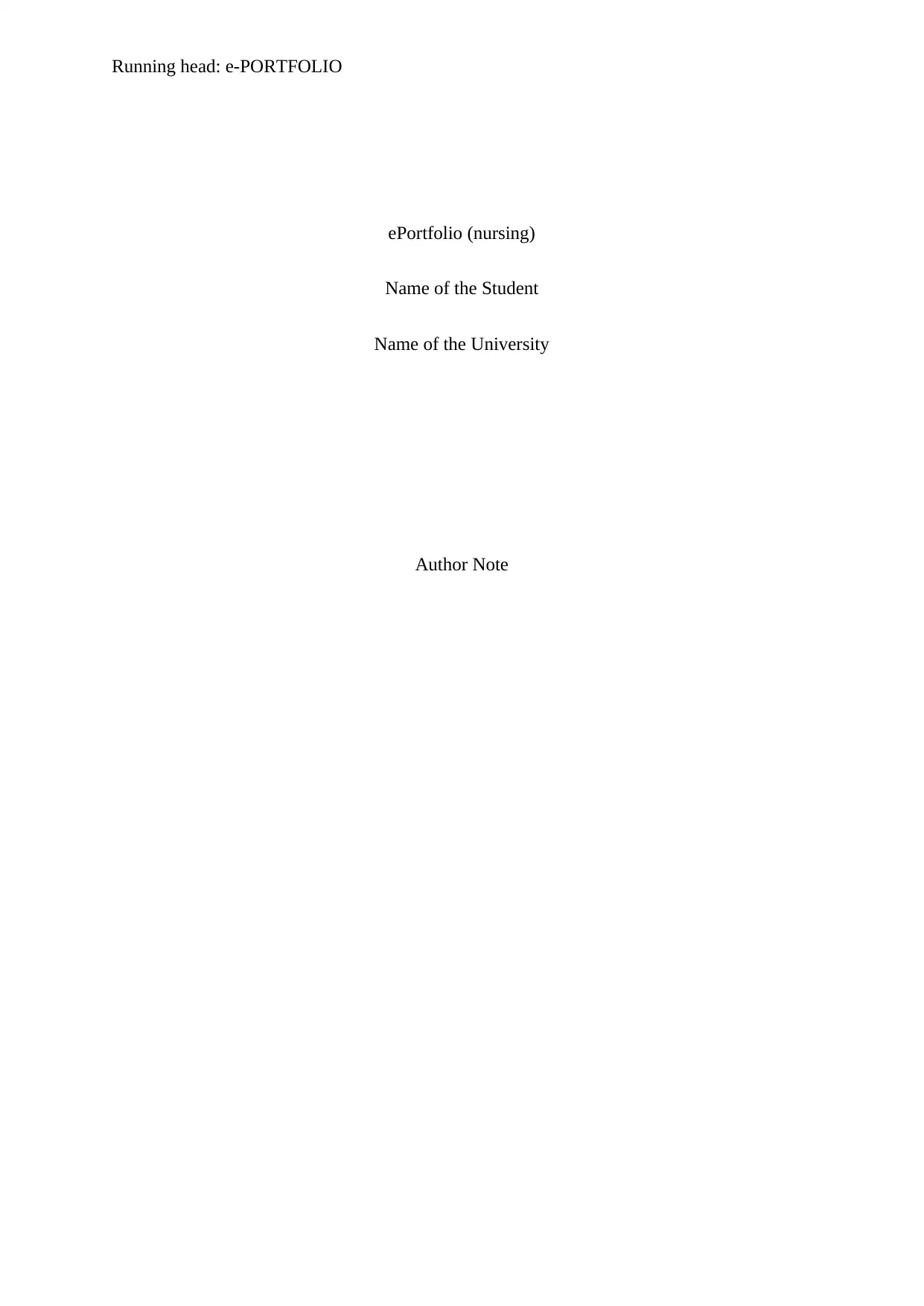
Running head: e-PORTFOLIO
ePortfolio (nursing)
Name of the Student
Name of the University
Author Note
ePortfolio (nursing)
Name of the Student
Name of the University
Author Note
Secure Best Marks with AI Grader
Need help grading? Try our AI Grader for instant feedback on your assignments.
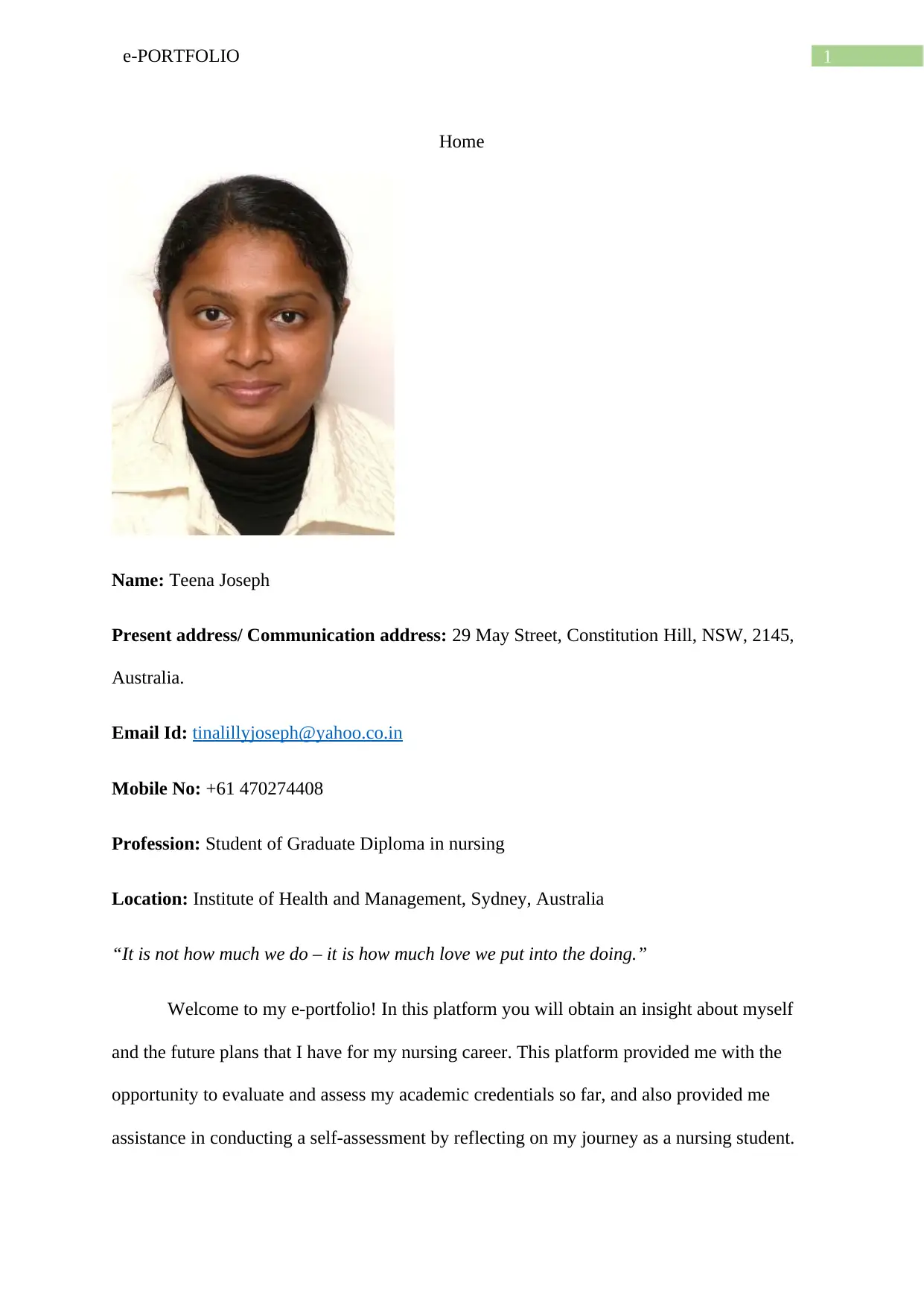
1e-PORTFOLIO
Home
Name: Teena Joseph
Present address/ Communication address: 29 May Street, Constitution Hill, NSW, 2145,
Australia.
Email Id: tinalillyjoseph@yahoo.co.in
Mobile No: +61 470274408
Profession: Student of Graduate Diploma in nursing
Location: Institute of Health and Management, Sydney, Australia
“It is not how much we do – it is how much love we put into the doing.”
Welcome to my e-portfolio! In this platform you will obtain an insight about myself
and the future plans that I have for my nursing career. This platform provided me with the
opportunity to evaluate and assess my academic credentials so far, and also provided me
assistance in conducting a self-assessment by reflecting on my journey as a nursing student.
Home
Name: Teena Joseph
Present address/ Communication address: 29 May Street, Constitution Hill, NSW, 2145,
Australia.
Email Id: tinalillyjoseph@yahoo.co.in
Mobile No: +61 470274408
Profession: Student of Graduate Diploma in nursing
Location: Institute of Health and Management, Sydney, Australia
“It is not how much we do – it is how much love we put into the doing.”
Welcome to my e-portfolio! In this platform you will obtain an insight about myself
and the future plans that I have for my nursing career. This platform provided me with the
opportunity to evaluate and assess my academic credentials so far, and also provided me
assistance in conducting a self-assessment by reflecting on my journey as a nursing student.
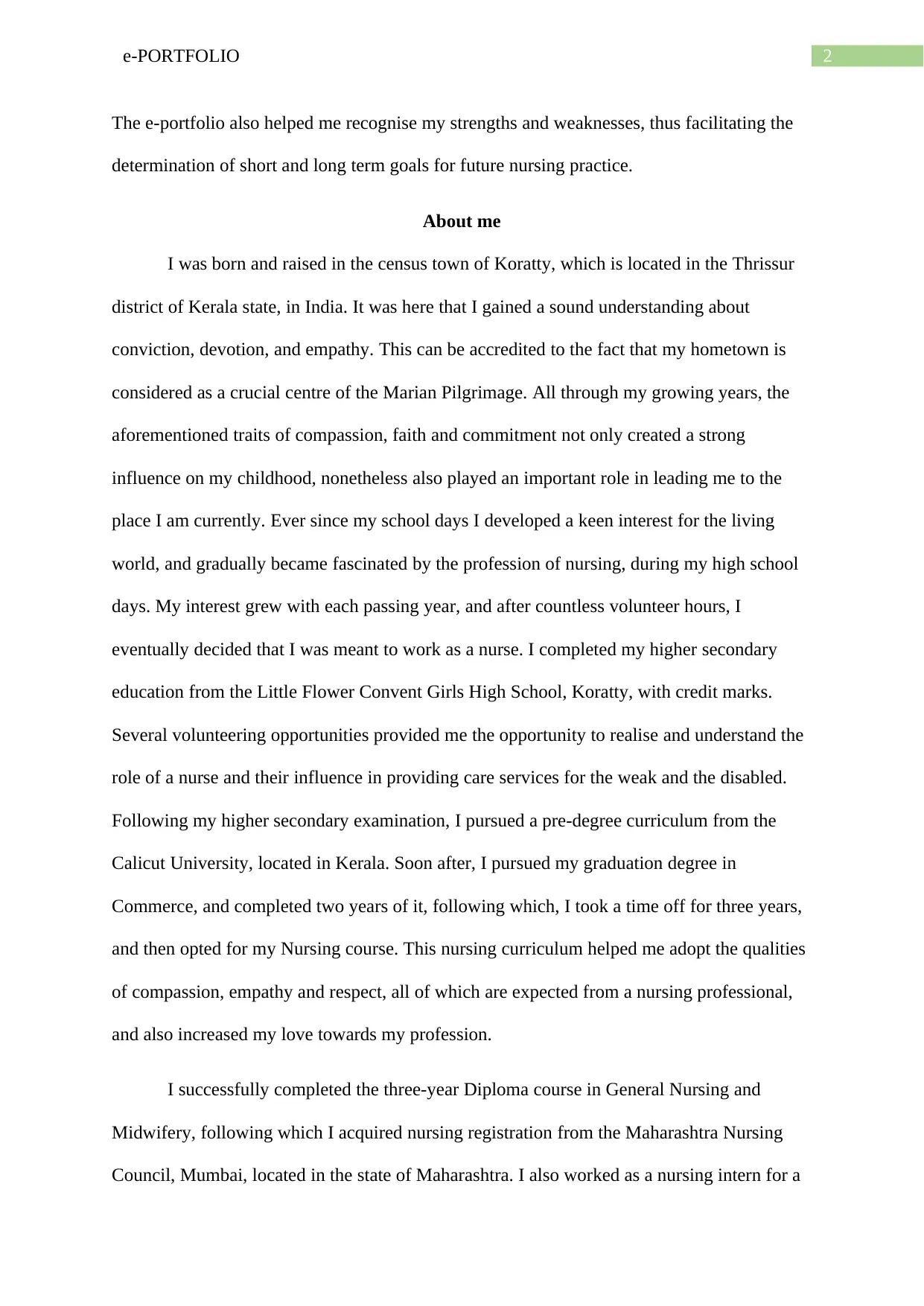
2e-PORTFOLIO
The e-portfolio also helped me recognise my strengths and weaknesses, thus facilitating the
determination of short and long term goals for future nursing practice.
About me
I was born and raised in the census town of Koratty, which is located in the Thrissur
district of Kerala state, in India. It was here that I gained a sound understanding about
conviction, devotion, and empathy. This can be accredited to the fact that my hometown is
considered as a crucial centre of the Marian Pilgrimage. All through my growing years, the
aforementioned traits of compassion, faith and commitment not only created a strong
influence on my childhood, nonetheless also played an important role in leading me to the
place I am currently. Ever since my school days I developed a keen interest for the living
world, and gradually became fascinated by the profession of nursing, during my high school
days. My interest grew with each passing year, and after countless volunteer hours, I
eventually decided that I was meant to work as a nurse. I completed my higher secondary
education from the Little Flower Convent Girls High School, Koratty, with credit marks.
Several volunteering opportunities provided me the opportunity to realise and understand the
role of a nurse and their influence in providing care services for the weak and the disabled.
Following my higher secondary examination, I pursued a pre-degree curriculum from the
Calicut University, located in Kerala. Soon after, I pursued my graduation degree in
Commerce, and completed two years of it, following which, I took a time off for three years,
and then opted for my Nursing course. This nursing curriculum helped me adopt the qualities
of compassion, empathy and respect, all of which are expected from a nursing professional,
and also increased my love towards my profession.
I successfully completed the three-year Diploma course in General Nursing and
Midwifery, following which I acquired nursing registration from the Maharashtra Nursing
Council, Mumbai, located in the state of Maharashtra. I also worked as a nursing intern for a
The e-portfolio also helped me recognise my strengths and weaknesses, thus facilitating the
determination of short and long term goals for future nursing practice.
About me
I was born and raised in the census town of Koratty, which is located in the Thrissur
district of Kerala state, in India. It was here that I gained a sound understanding about
conviction, devotion, and empathy. This can be accredited to the fact that my hometown is
considered as a crucial centre of the Marian Pilgrimage. All through my growing years, the
aforementioned traits of compassion, faith and commitment not only created a strong
influence on my childhood, nonetheless also played an important role in leading me to the
place I am currently. Ever since my school days I developed a keen interest for the living
world, and gradually became fascinated by the profession of nursing, during my high school
days. My interest grew with each passing year, and after countless volunteer hours, I
eventually decided that I was meant to work as a nurse. I completed my higher secondary
education from the Little Flower Convent Girls High School, Koratty, with credit marks.
Several volunteering opportunities provided me the opportunity to realise and understand the
role of a nurse and their influence in providing care services for the weak and the disabled.
Following my higher secondary examination, I pursued a pre-degree curriculum from the
Calicut University, located in Kerala. Soon after, I pursued my graduation degree in
Commerce, and completed two years of it, following which, I took a time off for three years,
and then opted for my Nursing course. This nursing curriculum helped me adopt the qualities
of compassion, empathy and respect, all of which are expected from a nursing professional,
and also increased my love towards my profession.
I successfully completed the three-year Diploma course in General Nursing and
Midwifery, following which I acquired nursing registration from the Maharashtra Nursing
Council, Mumbai, located in the state of Maharashtra. I also worked as a nursing intern for a
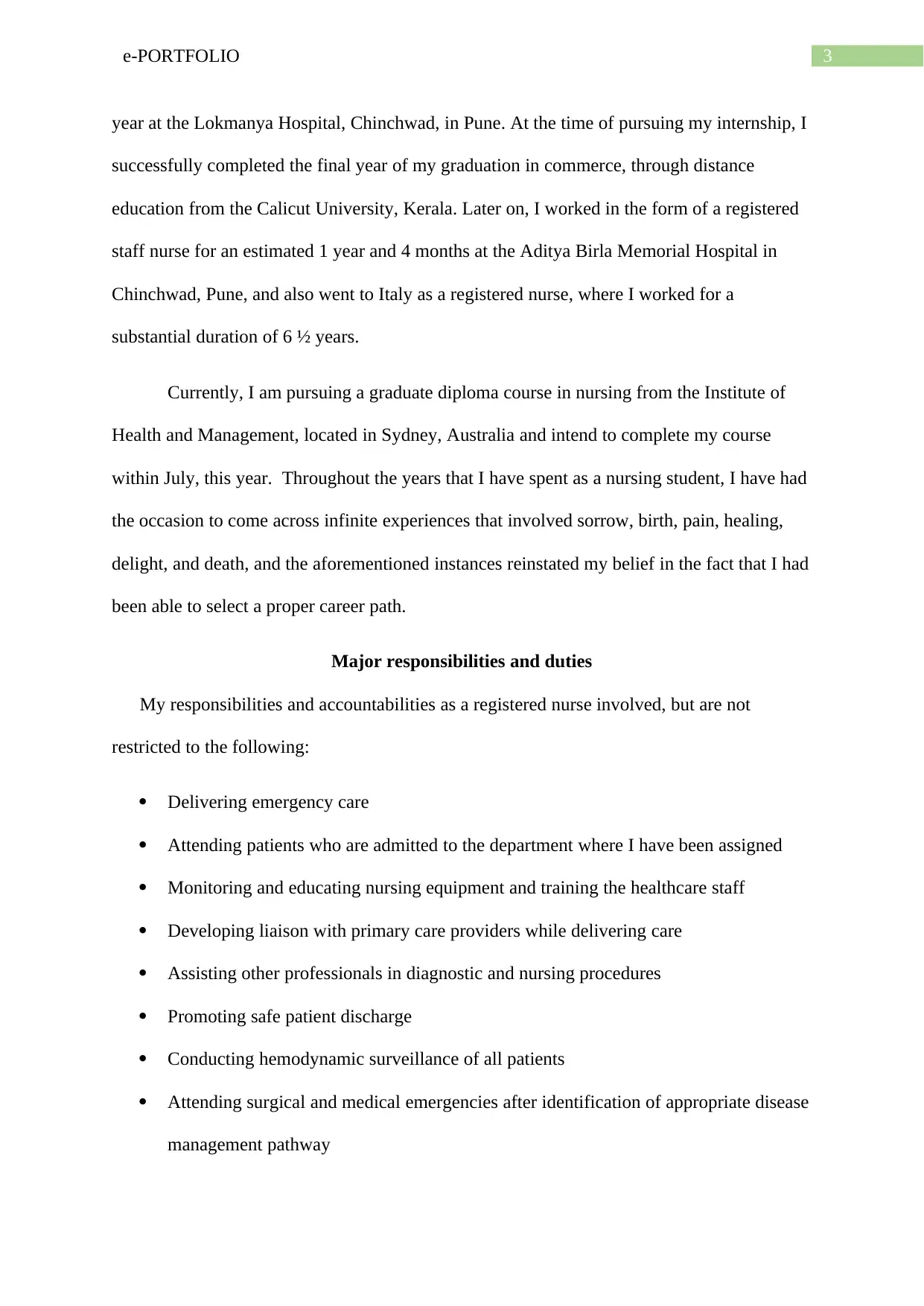
3e-PORTFOLIO
year at the Lokmanya Hospital, Chinchwad, in Pune. At the time of pursuing my internship, I
successfully completed the final year of my graduation in commerce, through distance
education from the Calicut University, Kerala. Later on, I worked in the form of a registered
staff nurse for an estimated 1 year and 4 months at the Aditya Birla Memorial Hospital in
Chinchwad, Pune, and also went to Italy as a registered nurse, where I worked for a
substantial duration of 6 ½ years.
Currently, I am pursuing a graduate diploma course in nursing from the Institute of
Health and Management, located in Sydney, Australia and intend to complete my course
within July, this year. Throughout the years that I have spent as a nursing student, I have had
the occasion to come across infinite experiences that involved sorrow, birth, pain, healing,
delight, and death, and the aforementioned instances reinstated my belief in the fact that I had
been able to select a proper career path.
Major responsibilities and duties
My responsibilities and accountabilities as a registered nurse involved, but are not
restricted to the following:
Delivering emergency care
Attending patients who are admitted to the department where I have been assigned
Monitoring and educating nursing equipment and training the healthcare staff
Developing liaison with primary care providers while delivering care
Assisting other professionals in diagnostic and nursing procedures
Promoting safe patient discharge
Conducting hemodynamic surveillance of all patients
Attending surgical and medical emergencies after identification of appropriate disease
management pathway
year at the Lokmanya Hospital, Chinchwad, in Pune. At the time of pursuing my internship, I
successfully completed the final year of my graduation in commerce, through distance
education from the Calicut University, Kerala. Later on, I worked in the form of a registered
staff nurse for an estimated 1 year and 4 months at the Aditya Birla Memorial Hospital in
Chinchwad, Pune, and also went to Italy as a registered nurse, where I worked for a
substantial duration of 6 ½ years.
Currently, I am pursuing a graduate diploma course in nursing from the Institute of
Health and Management, located in Sydney, Australia and intend to complete my course
within July, this year. Throughout the years that I have spent as a nursing student, I have had
the occasion to come across infinite experiences that involved sorrow, birth, pain, healing,
delight, and death, and the aforementioned instances reinstated my belief in the fact that I had
been able to select a proper career path.
Major responsibilities and duties
My responsibilities and accountabilities as a registered nurse involved, but are not
restricted to the following:
Delivering emergency care
Attending patients who are admitted to the department where I have been assigned
Monitoring and educating nursing equipment and training the healthcare staff
Developing liaison with primary care providers while delivering care
Assisting other professionals in diagnostic and nursing procedures
Promoting safe patient discharge
Conducting hemodynamic surveillance of all patients
Attending surgical and medical emergencies after identification of appropriate disease
management pathway
Secure Best Marks with AI Grader
Need help grading? Try our AI Grader for instant feedback on your assignments.
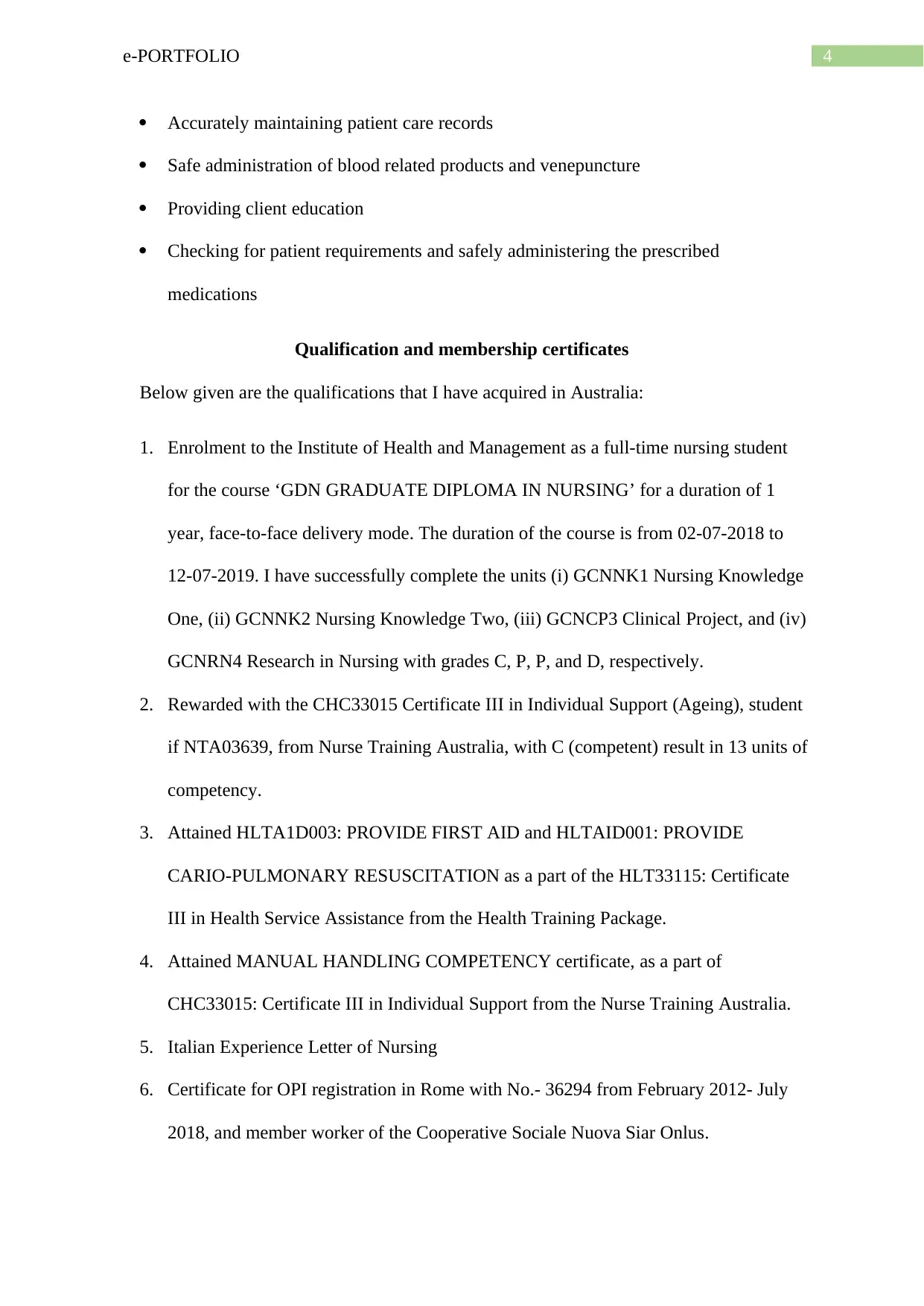
4e-PORTFOLIO
Accurately maintaining patient care records
Safe administration of blood related products and venepuncture
Providing client education
Checking for patient requirements and safely administering the prescribed
medications
Qualification and membership certificates
Below given are the qualifications that I have acquired in Australia:
1. Enrolment to the Institute of Health and Management as a full-time nursing student
for the course ‘GDN GRADUATE DIPLOMA IN NURSING’ for a duration of 1
year, face-to-face delivery mode. The duration of the course is from 02-07-2018 to
12-07-2019. I have successfully complete the units (i) GCNNK1 Nursing Knowledge
One, (ii) GCNNK2 Nursing Knowledge Two, (iii) GCNCP3 Clinical Project, and (iv)
GCNRN4 Research in Nursing with grades C, P, P, and D, respectively.
2. Rewarded with the CHC33015 Certificate III in Individual Support (Ageing), student
if NTA03639, from Nurse Training Australia, with C (competent) result in 13 units of
competency.
3. Attained HLTA1D003: PROVIDE FIRST AID and HLTAID001: PROVIDE
CARIO-PULMONARY RESUSCITATION as a part of the HLT33115: Certificate
III in Health Service Assistance from the Health Training Package.
4. Attained MANUAL HANDLING COMPETENCY certificate, as a part of
CHC33015: Certificate III in Individual Support from the Nurse Training Australia.
5. Italian Experience Letter of Nursing
6. Certificate for OPI registration in Rome with No.- 36294 from February 2012- July
2018, and member worker of the Cooperative Sociale Nuova Siar Onlus.
Accurately maintaining patient care records
Safe administration of blood related products and venepuncture
Providing client education
Checking for patient requirements and safely administering the prescribed
medications
Qualification and membership certificates
Below given are the qualifications that I have acquired in Australia:
1. Enrolment to the Institute of Health and Management as a full-time nursing student
for the course ‘GDN GRADUATE DIPLOMA IN NURSING’ for a duration of 1
year, face-to-face delivery mode. The duration of the course is from 02-07-2018 to
12-07-2019. I have successfully complete the units (i) GCNNK1 Nursing Knowledge
One, (ii) GCNNK2 Nursing Knowledge Two, (iii) GCNCP3 Clinical Project, and (iv)
GCNRN4 Research in Nursing with grades C, P, P, and D, respectively.
2. Rewarded with the CHC33015 Certificate III in Individual Support (Ageing), student
if NTA03639, from Nurse Training Australia, with C (competent) result in 13 units of
competency.
3. Attained HLTA1D003: PROVIDE FIRST AID and HLTAID001: PROVIDE
CARIO-PULMONARY RESUSCITATION as a part of the HLT33115: Certificate
III in Health Service Assistance from the Health Training Package.
4. Attained MANUAL HANDLING COMPETENCY certificate, as a part of
CHC33015: Certificate III in Individual Support from the Nurse Training Australia.
5. Italian Experience Letter of Nursing
6. Certificate for OPI registration in Rome with No.- 36294 from February 2012- July
2018, and member worker of the Cooperative Sociale Nuova Siar Onlus.
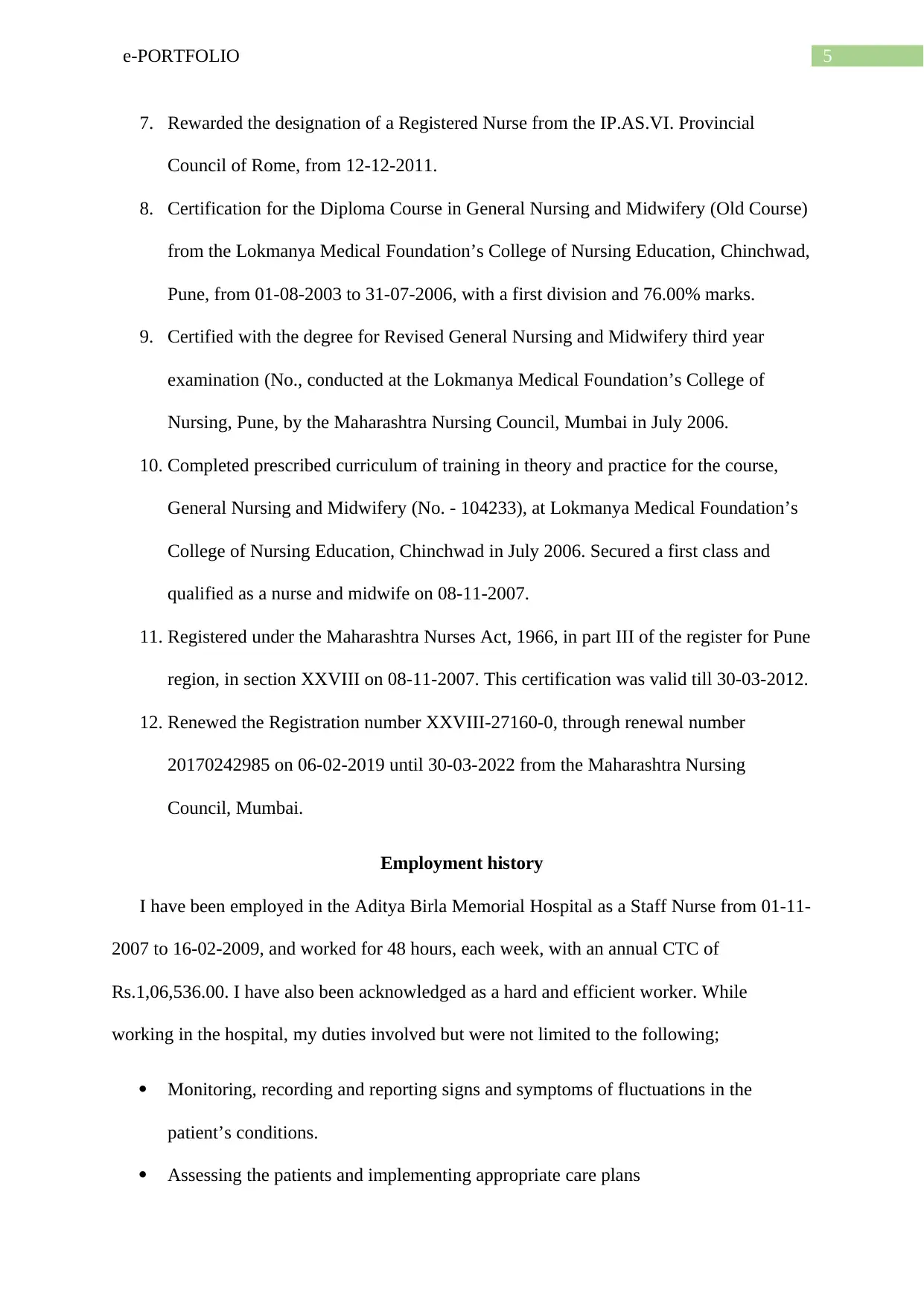
5e-PORTFOLIO
7. Rewarded the designation of a Registered Nurse from the IP.AS.VI. Provincial
Council of Rome, from 12-12-2011.
8. Certification for the Diploma Course in General Nursing and Midwifery (Old Course)
from the Lokmanya Medical Foundation’s College of Nursing Education, Chinchwad,
Pune, from 01-08-2003 to 31-07-2006, with a first division and 76.00% marks.
9. Certified with the degree for Revised General Nursing and Midwifery third year
examination (No., conducted at the Lokmanya Medical Foundation’s College of
Nursing, Pune, by the Maharashtra Nursing Council, Mumbai in July 2006.
10. Completed prescribed curriculum of training in theory and practice for the course,
General Nursing and Midwifery (No. - 104233), at Lokmanya Medical Foundation’s
College of Nursing Education, Chinchwad in July 2006. Secured a first class and
qualified as a nurse and midwife on 08-11-2007.
11. Registered under the Maharashtra Nurses Act, 1966, in part III of the register for Pune
region, in section XXVIII on 08-11-2007. This certification was valid till 30-03-2012.
12. Renewed the Registration number XXVIII-27160-0, through renewal number
20170242985 on 06-02-2019 until 30-03-2022 from the Maharashtra Nursing
Council, Mumbai.
Employment history
I have been employed in the Aditya Birla Memorial Hospital as a Staff Nurse from 01-11-
2007 to 16-02-2009, and worked for 48 hours, each week, with an annual CTC of
Rs.1,06,536.00. I have also been acknowledged as a hard and efficient worker. While
working in the hospital, my duties involved but were not limited to the following;
Monitoring, recording and reporting signs and symptoms of fluctuations in the
patient’s conditions.
Assessing the patients and implementing appropriate care plans
7. Rewarded the designation of a Registered Nurse from the IP.AS.VI. Provincial
Council of Rome, from 12-12-2011.
8. Certification for the Diploma Course in General Nursing and Midwifery (Old Course)
from the Lokmanya Medical Foundation’s College of Nursing Education, Chinchwad,
Pune, from 01-08-2003 to 31-07-2006, with a first division and 76.00% marks.
9. Certified with the degree for Revised General Nursing and Midwifery third year
examination (No., conducted at the Lokmanya Medical Foundation’s College of
Nursing, Pune, by the Maharashtra Nursing Council, Mumbai in July 2006.
10. Completed prescribed curriculum of training in theory and practice for the course,
General Nursing and Midwifery (No. - 104233), at Lokmanya Medical Foundation’s
College of Nursing Education, Chinchwad in July 2006. Secured a first class and
qualified as a nurse and midwife on 08-11-2007.
11. Registered under the Maharashtra Nurses Act, 1966, in part III of the register for Pune
region, in section XXVIII on 08-11-2007. This certification was valid till 30-03-2012.
12. Renewed the Registration number XXVIII-27160-0, through renewal number
20170242985 on 06-02-2019 until 30-03-2022 from the Maharashtra Nursing
Council, Mumbai.
Employment history
I have been employed in the Aditya Birla Memorial Hospital as a Staff Nurse from 01-11-
2007 to 16-02-2009, and worked for 48 hours, each week, with an annual CTC of
Rs.1,06,536.00. I have also been acknowledged as a hard and efficient worker. While
working in the hospital, my duties involved but were not limited to the following;
Monitoring, recording and reporting signs and symptoms of fluctuations in the
patient’s conditions.
Assessing the patients and implementing appropriate care plans
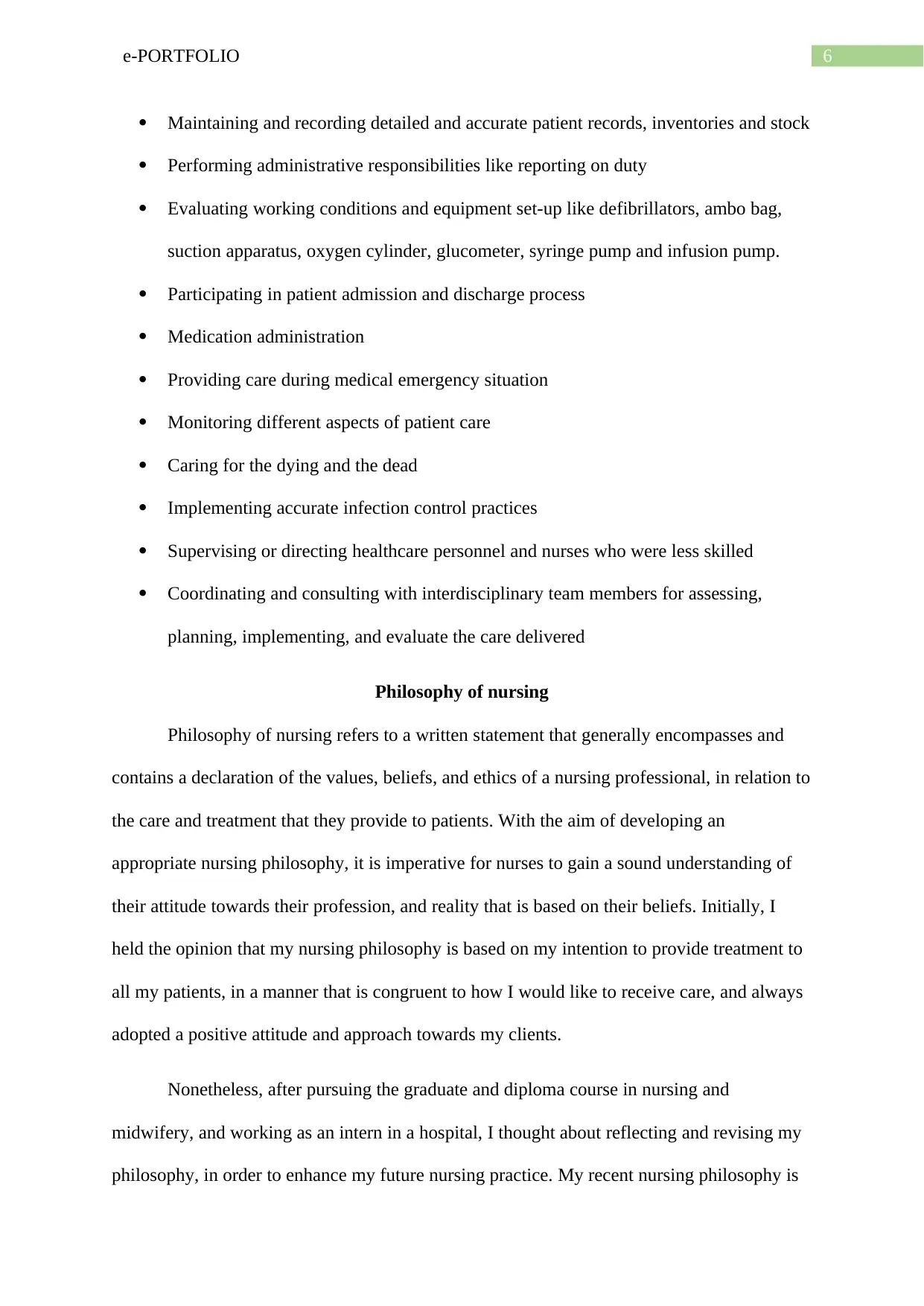
6e-PORTFOLIO
Maintaining and recording detailed and accurate patient records, inventories and stock
Performing administrative responsibilities like reporting on duty
Evaluating working conditions and equipment set-up like defibrillators, ambo bag,
suction apparatus, oxygen cylinder, glucometer, syringe pump and infusion pump.
Participating in patient admission and discharge process
Medication administration
Providing care during medical emergency situation
Monitoring different aspects of patient care
Caring for the dying and the dead
Implementing accurate infection control practices
Supervising or directing healthcare personnel and nurses who were less skilled
Coordinating and consulting with interdisciplinary team members for assessing,
planning, implementing, and evaluate the care delivered
Philosophy of nursing
Philosophy of nursing refers to a written statement that generally encompasses and
contains a declaration of the values, beliefs, and ethics of a nursing professional, in relation to
the care and treatment that they provide to patients. With the aim of developing an
appropriate nursing philosophy, it is imperative for nurses to gain a sound understanding of
their attitude towards their profession, and reality that is based on their beliefs. Initially, I
held the opinion that my nursing philosophy is based on my intention to provide treatment to
all my patients, in a manner that is congruent to how I would like to receive care, and always
adopted a positive attitude and approach towards my clients.
Nonetheless, after pursuing the graduate and diploma course in nursing and
midwifery, and working as an intern in a hospital, I thought about reflecting and revising my
philosophy, in order to enhance my future nursing practice. My recent nursing philosophy is
Maintaining and recording detailed and accurate patient records, inventories and stock
Performing administrative responsibilities like reporting on duty
Evaluating working conditions and equipment set-up like defibrillators, ambo bag,
suction apparatus, oxygen cylinder, glucometer, syringe pump and infusion pump.
Participating in patient admission and discharge process
Medication administration
Providing care during medical emergency situation
Monitoring different aspects of patient care
Caring for the dying and the dead
Implementing accurate infection control practices
Supervising or directing healthcare personnel and nurses who were less skilled
Coordinating and consulting with interdisciplinary team members for assessing,
planning, implementing, and evaluate the care delivered
Philosophy of nursing
Philosophy of nursing refers to a written statement that generally encompasses and
contains a declaration of the values, beliefs, and ethics of a nursing professional, in relation to
the care and treatment that they provide to patients. With the aim of developing an
appropriate nursing philosophy, it is imperative for nurses to gain a sound understanding of
their attitude towards their profession, and reality that is based on their beliefs. Initially, I
held the opinion that my nursing philosophy is based on my intention to provide treatment to
all my patients, in a manner that is congruent to how I would like to receive care, and always
adopted a positive attitude and approach towards my clients.
Nonetheless, after pursuing the graduate and diploma course in nursing and
midwifery, and working as an intern in a hospital, I thought about reflecting and revising my
philosophy, in order to enhance my future nursing practice. My recent nursing philosophy is
Paraphrase This Document
Need a fresh take? Get an instant paraphrase of this document with our AI Paraphraser
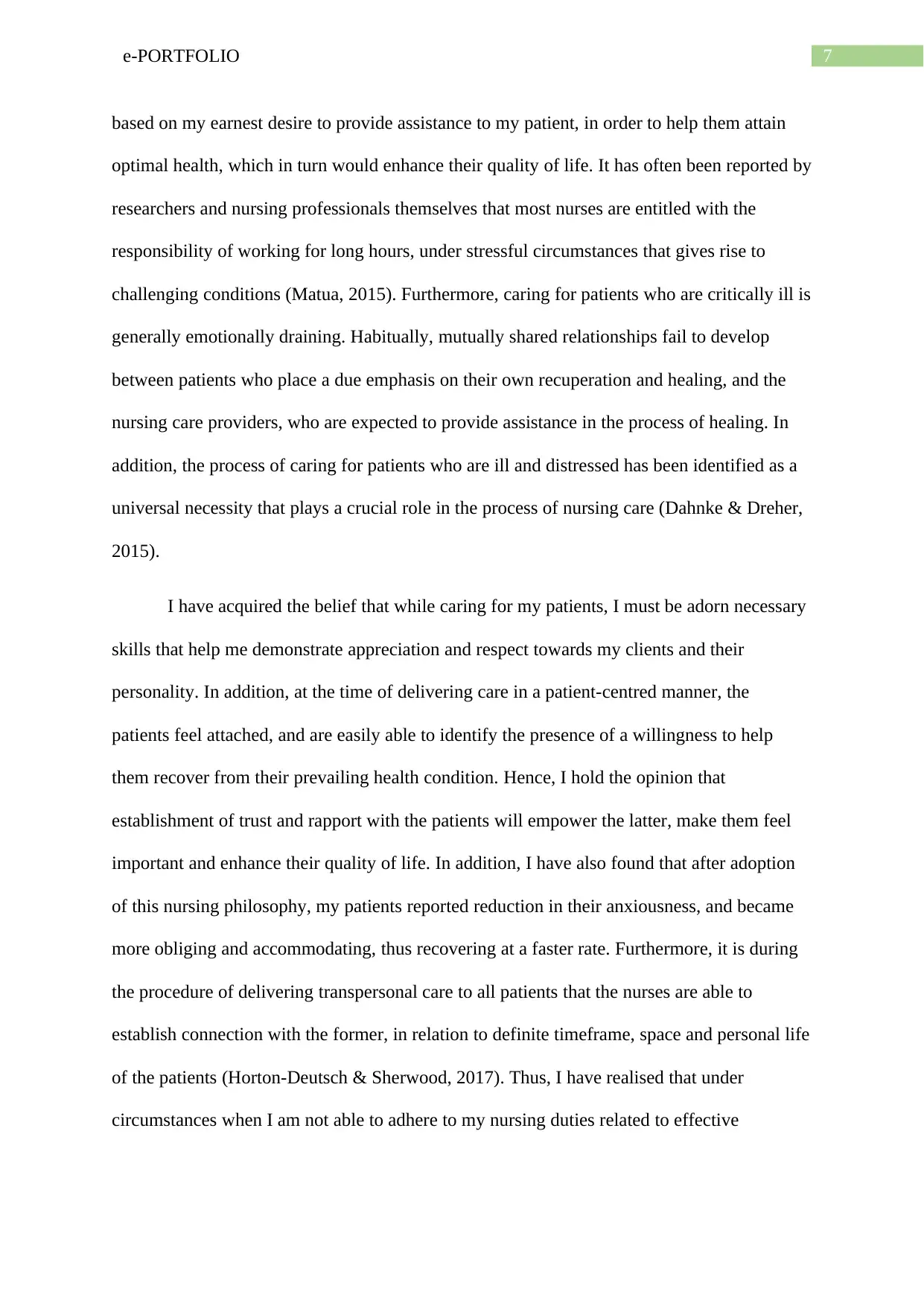
7e-PORTFOLIO
based on my earnest desire to provide assistance to my patient, in order to help them attain
optimal health, which in turn would enhance their quality of life. It has often been reported by
researchers and nursing professionals themselves that most nurses are entitled with the
responsibility of working for long hours, under stressful circumstances that gives rise to
challenging conditions (Matua, 2015). Furthermore, caring for patients who are critically ill is
generally emotionally draining. Habitually, mutually shared relationships fail to develop
between patients who place a due emphasis on their own recuperation and healing, and the
nursing care providers, who are expected to provide assistance in the process of healing. In
addition, the process of caring for patients who are ill and distressed has been identified as a
universal necessity that plays a crucial role in the process of nursing care (Dahnke & Dreher,
2015).
I have acquired the belief that while caring for my patients, I must be adorn necessary
skills that help me demonstrate appreciation and respect towards my clients and their
personality. In addition, at the time of delivering care in a patient-centred manner, the
patients feel attached, and are easily able to identify the presence of a willingness to help
them recover from their prevailing health condition. Hence, I hold the opinion that
establishment of trust and rapport with the patients will empower the latter, make them feel
important and enhance their quality of life. In addition, I have also found that after adoption
of this nursing philosophy, my patients reported reduction in their anxiousness, and became
more obliging and accommodating, thus recovering at a faster rate. Furthermore, it is during
the procedure of delivering transpersonal care to all patients that the nurses are able to
establish connection with the former, in relation to definite timeframe, space and personal life
of the patients (Horton-Deutsch & Sherwood, 2017). Thus, I have realised that under
circumstances when I am not able to adhere to my nursing duties related to effective
based on my earnest desire to provide assistance to my patient, in order to help them attain
optimal health, which in turn would enhance their quality of life. It has often been reported by
researchers and nursing professionals themselves that most nurses are entitled with the
responsibility of working for long hours, under stressful circumstances that gives rise to
challenging conditions (Matua, 2015). Furthermore, caring for patients who are critically ill is
generally emotionally draining. Habitually, mutually shared relationships fail to develop
between patients who place a due emphasis on their own recuperation and healing, and the
nursing care providers, who are expected to provide assistance in the process of healing. In
addition, the process of caring for patients who are ill and distressed has been identified as a
universal necessity that plays a crucial role in the process of nursing care (Dahnke & Dreher,
2015).
I have acquired the belief that while caring for my patients, I must be adorn necessary
skills that help me demonstrate appreciation and respect towards my clients and their
personality. In addition, at the time of delivering care in a patient-centred manner, the
patients feel attached, and are easily able to identify the presence of a willingness to help
them recover from their prevailing health condition. Hence, I hold the opinion that
establishment of trust and rapport with the patients will empower the latter, make them feel
important and enhance their quality of life. In addition, I have also found that after adoption
of this nursing philosophy, my patients reported reduction in their anxiousness, and became
more obliging and accommodating, thus recovering at a faster rate. Furthermore, it is during
the procedure of delivering transpersonal care to all patients that the nurses are able to
establish connection with the former, in relation to definite timeframe, space and personal life
of the patients (Horton-Deutsch & Sherwood, 2017). Thus, I have realised that under
circumstances when I am not able to adhere to my nursing duties related to effective
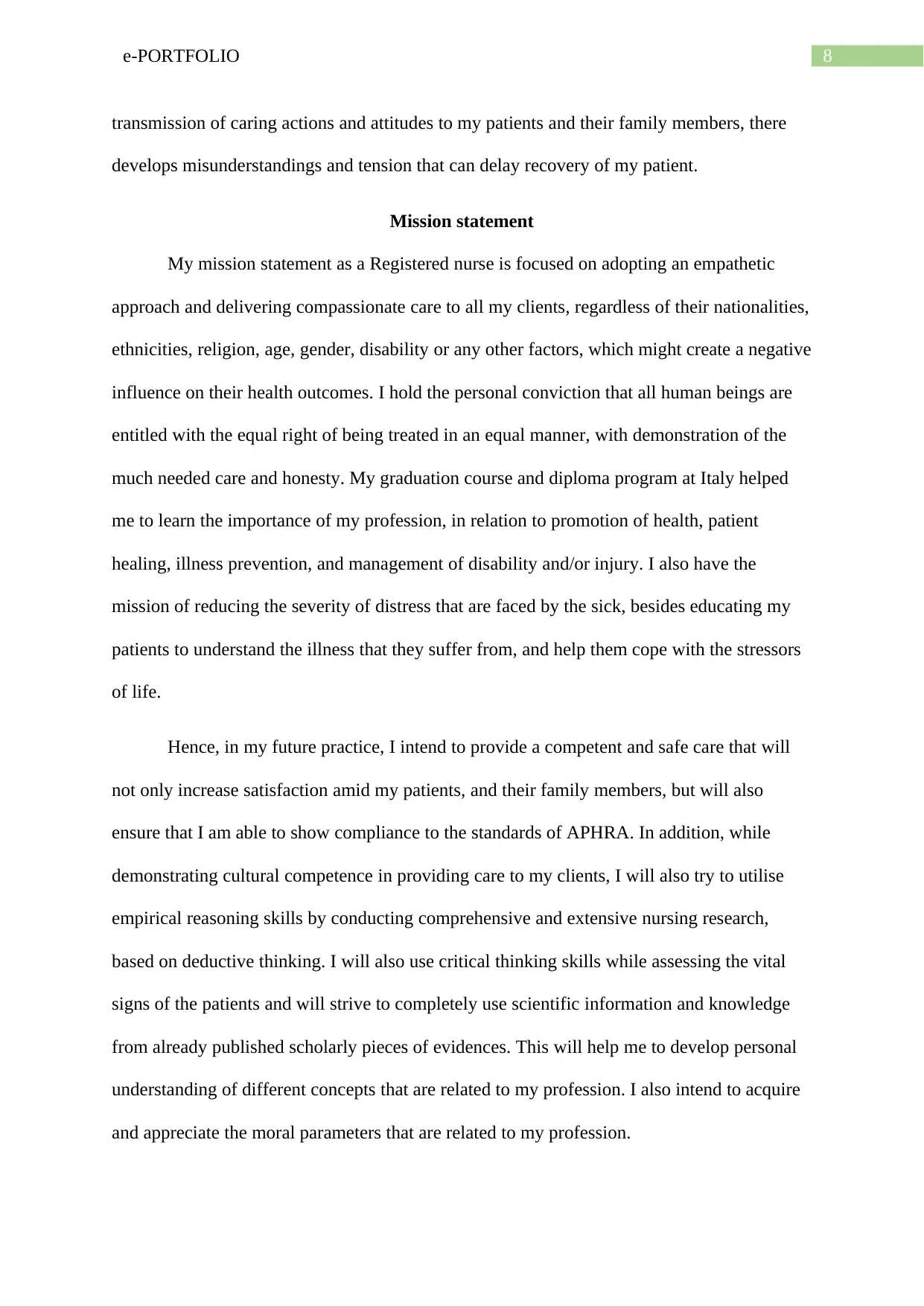
8e-PORTFOLIO
transmission of caring actions and attitudes to my patients and their family members, there
develops misunderstandings and tension that can delay recovery of my patient.
Mission statement
My mission statement as a Registered nurse is focused on adopting an empathetic
approach and delivering compassionate care to all my clients, regardless of their nationalities,
ethnicities, religion, age, gender, disability or any other factors, which might create a negative
influence on their health outcomes. I hold the personal conviction that all human beings are
entitled with the equal right of being treated in an equal manner, with demonstration of the
much needed care and honesty. My graduation course and diploma program at Italy helped
me to learn the importance of my profession, in relation to promotion of health, patient
healing, illness prevention, and management of disability and/or injury. I also have the
mission of reducing the severity of distress that are faced by the sick, besides educating my
patients to understand the illness that they suffer from, and help them cope with the stressors
of life.
Hence, in my future practice, I intend to provide a competent and safe care that will
not only increase satisfaction amid my patients, and their family members, but will also
ensure that I am able to show compliance to the standards of APHRA. In addition, while
demonstrating cultural competence in providing care to my clients, I will also try to utilise
empirical reasoning skills by conducting comprehensive and extensive nursing research,
based on deductive thinking. I will also use critical thinking skills while assessing the vital
signs of the patients and will strive to completely use scientific information and knowledge
from already published scholarly pieces of evidences. This will help me to develop personal
understanding of different concepts that are related to my profession. I also intend to acquire
and appreciate the moral parameters that are related to my profession.
transmission of caring actions and attitudes to my patients and their family members, there
develops misunderstandings and tension that can delay recovery of my patient.
Mission statement
My mission statement as a Registered nurse is focused on adopting an empathetic
approach and delivering compassionate care to all my clients, regardless of their nationalities,
ethnicities, religion, age, gender, disability or any other factors, which might create a negative
influence on their health outcomes. I hold the personal conviction that all human beings are
entitled with the equal right of being treated in an equal manner, with demonstration of the
much needed care and honesty. My graduation course and diploma program at Italy helped
me to learn the importance of my profession, in relation to promotion of health, patient
healing, illness prevention, and management of disability and/or injury. I also have the
mission of reducing the severity of distress that are faced by the sick, besides educating my
patients to understand the illness that they suffer from, and help them cope with the stressors
of life.
Hence, in my future practice, I intend to provide a competent and safe care that will
not only increase satisfaction amid my patients, and their family members, but will also
ensure that I am able to show compliance to the standards of APHRA. In addition, while
demonstrating cultural competence in providing care to my clients, I will also try to utilise
empirical reasoning skills by conducting comprehensive and extensive nursing research,
based on deductive thinking. I will also use critical thinking skills while assessing the vital
signs of the patients and will strive to completely use scientific information and knowledge
from already published scholarly pieces of evidences. This will help me to develop personal
understanding of different concepts that are related to my profession. I also intend to acquire
and appreciate the moral parameters that are related to my profession.
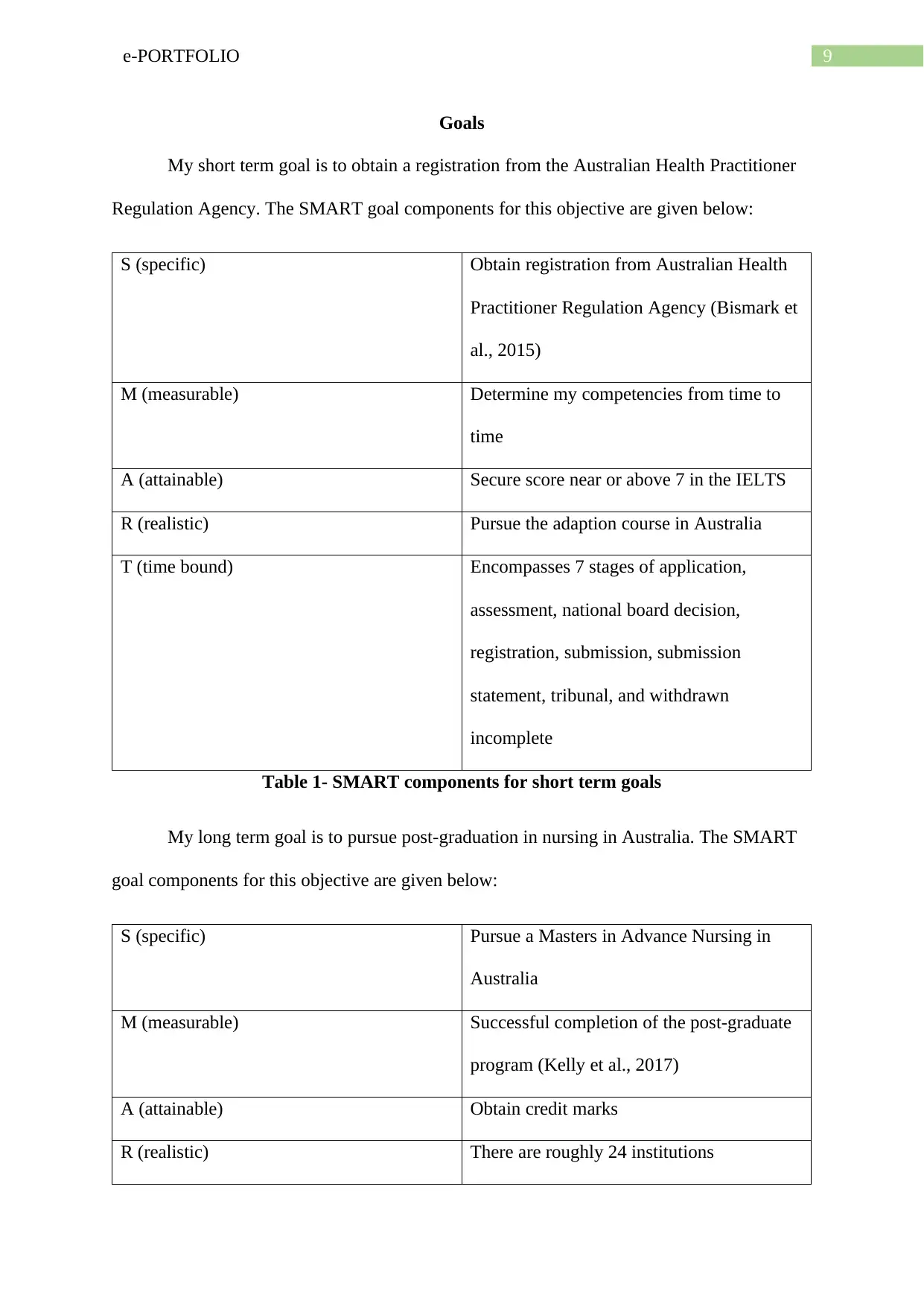
9e-PORTFOLIO
Goals
My short term goal is to obtain a registration from the Australian Health Practitioner
Regulation Agency. The SMART goal components for this objective are given below:
S (specific) Obtain registration from Australian Health
Practitioner Regulation Agency (Bismark et
al., 2015)
M (measurable) Determine my competencies from time to
time
A (attainable) Secure score near or above 7 in the IELTS
R (realistic) Pursue the adaption course in Australia
T (time bound) Encompasses 7 stages of application,
assessment, national board decision,
registration, submission, submission
statement, tribunal, and withdrawn
incomplete
Table 1- SMART components for short term goals
My long term goal is to pursue post-graduation in nursing in Australia. The SMART
goal components for this objective are given below:
S (specific) Pursue a Masters in Advance Nursing in
Australia
M (measurable) Successful completion of the post-graduate
program (Kelly et al., 2017)
A (attainable) Obtain credit marks
R (realistic) There are roughly 24 institutions
Goals
My short term goal is to obtain a registration from the Australian Health Practitioner
Regulation Agency. The SMART goal components for this objective are given below:
S (specific) Obtain registration from Australian Health
Practitioner Regulation Agency (Bismark et
al., 2015)
M (measurable) Determine my competencies from time to
time
A (attainable) Secure score near or above 7 in the IELTS
R (realistic) Pursue the adaption course in Australia
T (time bound) Encompasses 7 stages of application,
assessment, national board decision,
registration, submission, submission
statement, tribunal, and withdrawn
incomplete
Table 1- SMART components for short term goals
My long term goal is to pursue post-graduation in nursing in Australia. The SMART
goal components for this objective are given below:
S (specific) Pursue a Masters in Advance Nursing in
Australia
M (measurable) Successful completion of the post-graduate
program (Kelly et al., 2017)
A (attainable) Obtain credit marks
R (realistic) There are roughly 24 institutions
Secure Best Marks with AI Grader
Need help grading? Try our AI Grader for instant feedback on your assignments.
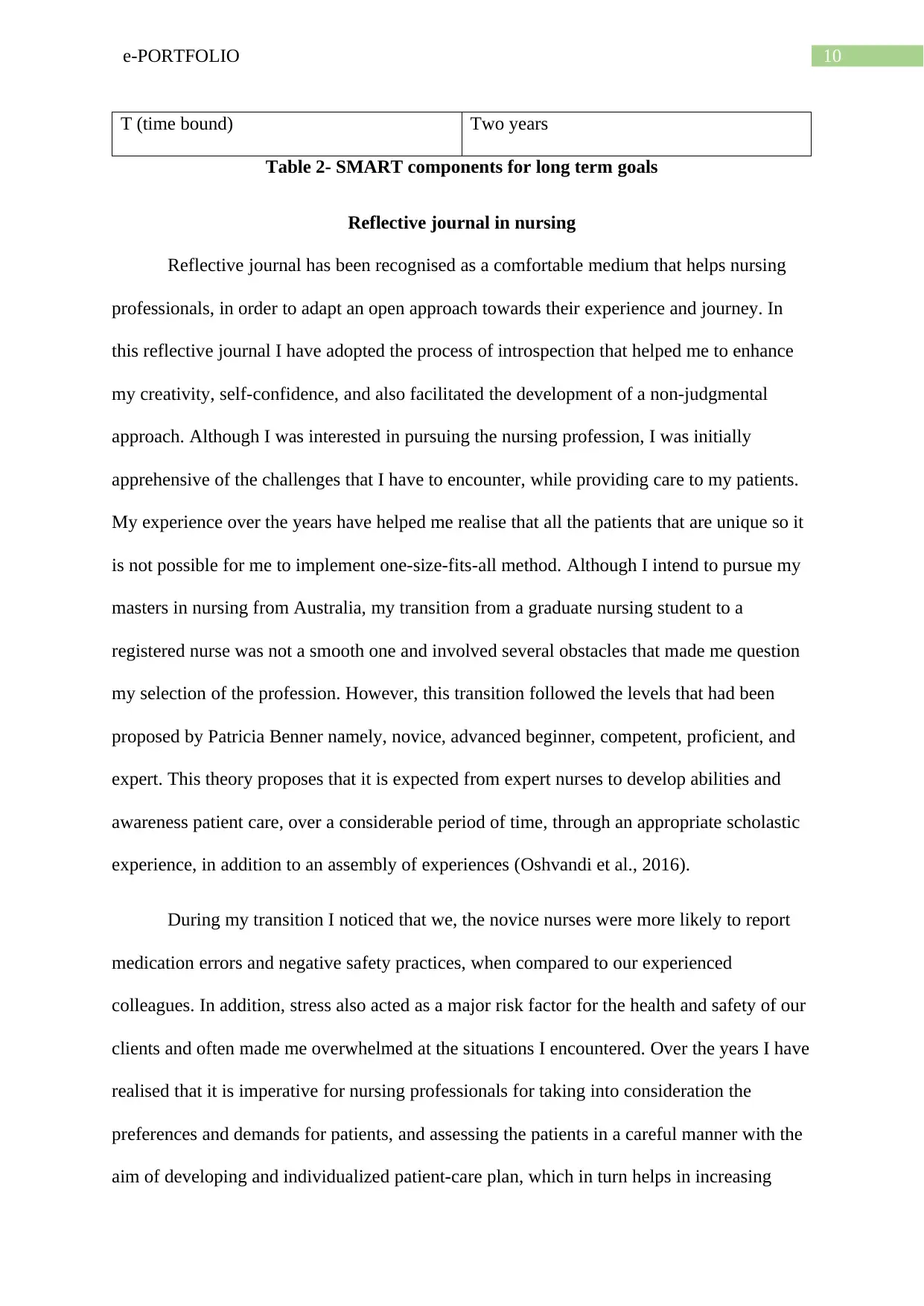
10e-PORTFOLIO
T (time bound) Two years
Table 2- SMART components for long term goals
Reflective journal in nursing
Reflective journal has been recognised as a comfortable medium that helps nursing
professionals, in order to adapt an open approach towards their experience and journey. In
this reflective journal I have adopted the process of introspection that helped me to enhance
my creativity, self-confidence, and also facilitated the development of a non-judgmental
approach. Although I was interested in pursuing the nursing profession, I was initially
apprehensive of the challenges that I have to encounter, while providing care to my patients.
My experience over the years have helped me realise that all the patients that are unique so it
is not possible for me to implement one-size-fits-all method. Although I intend to pursue my
masters in nursing from Australia, my transition from a graduate nursing student to a
registered nurse was not a smooth one and involved several obstacles that made me question
my selection of the profession. However, this transition followed the levels that had been
proposed by Patricia Benner namely, novice, advanced beginner, competent, proficient, and
expert. This theory proposes that it is expected from expert nurses to develop abilities and
awareness patient care, over a considerable period of time, through an appropriate scholastic
experience, in addition to an assembly of experiences (Oshvandi et al., 2016).
During my transition I noticed that we, the novice nurses were more likely to report
medication errors and negative safety practices, when compared to our experienced
colleagues. In addition, stress also acted as a major risk factor for the health and safety of our
clients and often made me overwhelmed at the situations I encountered. Over the years I have
realised that it is imperative for nursing professionals for taking into consideration the
preferences and demands for patients, and assessing the patients in a careful manner with the
aim of developing and individualized patient-care plan, which in turn helps in increasing
T (time bound) Two years
Table 2- SMART components for long term goals
Reflective journal in nursing
Reflective journal has been recognised as a comfortable medium that helps nursing
professionals, in order to adapt an open approach towards their experience and journey. In
this reflective journal I have adopted the process of introspection that helped me to enhance
my creativity, self-confidence, and also facilitated the development of a non-judgmental
approach. Although I was interested in pursuing the nursing profession, I was initially
apprehensive of the challenges that I have to encounter, while providing care to my patients.
My experience over the years have helped me realise that all the patients that are unique so it
is not possible for me to implement one-size-fits-all method. Although I intend to pursue my
masters in nursing from Australia, my transition from a graduate nursing student to a
registered nurse was not a smooth one and involved several obstacles that made me question
my selection of the profession. However, this transition followed the levels that had been
proposed by Patricia Benner namely, novice, advanced beginner, competent, proficient, and
expert. This theory proposes that it is expected from expert nurses to develop abilities and
awareness patient care, over a considerable period of time, through an appropriate scholastic
experience, in addition to an assembly of experiences (Oshvandi et al., 2016).
During my transition I noticed that we, the novice nurses were more likely to report
medication errors and negative safety practices, when compared to our experienced
colleagues. In addition, stress also acted as a major risk factor for the health and safety of our
clients and often made me overwhelmed at the situations I encountered. Over the years I have
realised that it is imperative for nursing professionals for taking into consideration the
preferences and demands for patients, and assessing the patients in a careful manner with the
aim of developing and individualized patient-care plan, which in turn helps in increasing
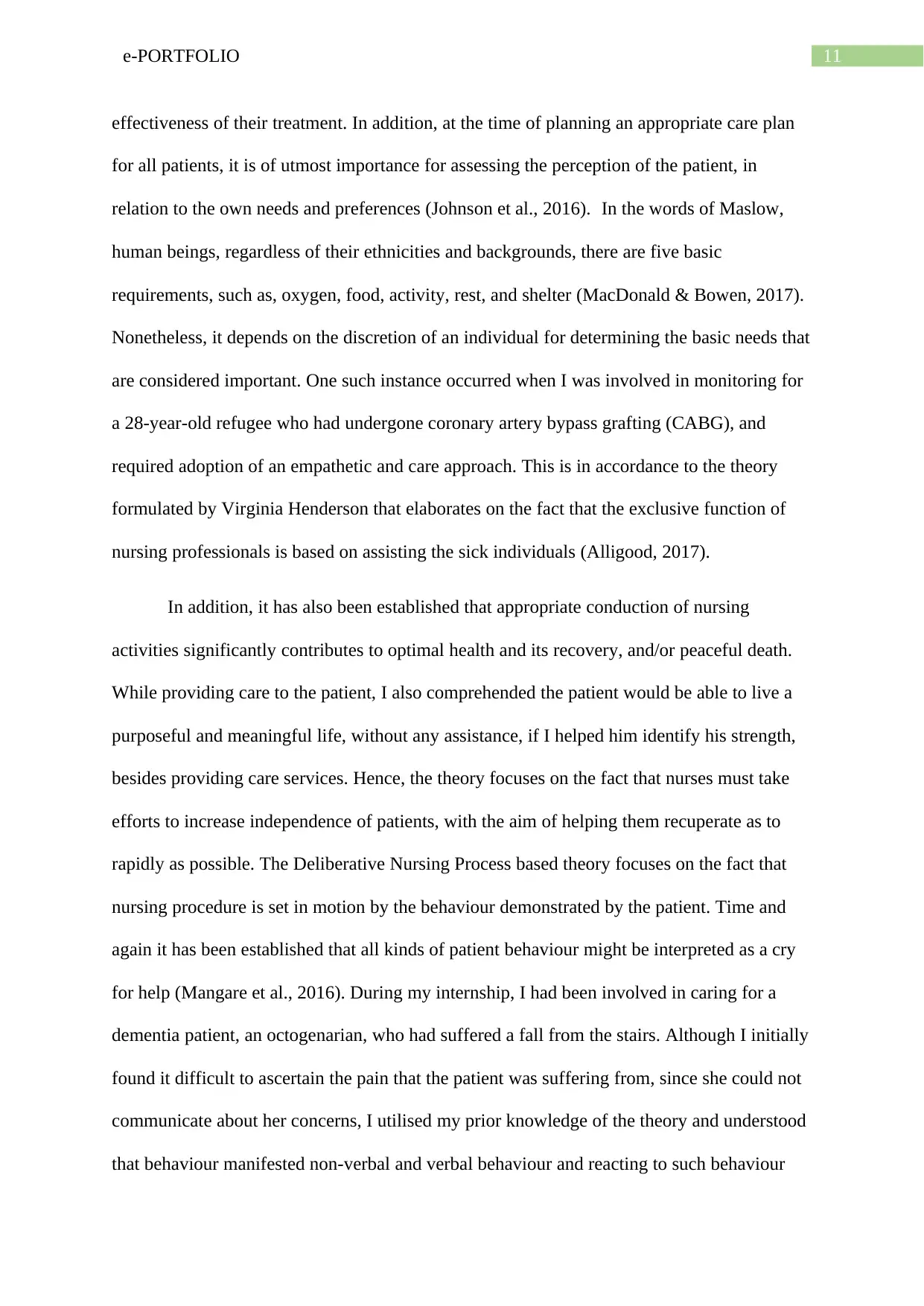
11e-PORTFOLIO
effectiveness of their treatment. In addition, at the time of planning an appropriate care plan
for all patients, it is of utmost importance for assessing the perception of the patient, in
relation to the own needs and preferences (Johnson et al., 2016). In the words of Maslow,
human beings, regardless of their ethnicities and backgrounds, there are five basic
requirements, such as, oxygen, food, activity, rest, and shelter (MacDonald & Bowen, 2017).
Nonetheless, it depends on the discretion of an individual for determining the basic needs that
are considered important. One such instance occurred when I was involved in monitoring for
a 28-year-old refugee who had undergone coronary artery bypass grafting (CABG), and
required adoption of an empathetic and care approach. This is in accordance to the theory
formulated by Virginia Henderson that elaborates on the fact that the exclusive function of
nursing professionals is based on assisting the sick individuals (Alligood, 2017).
In addition, it has also been established that appropriate conduction of nursing
activities significantly contributes to optimal health and its recovery, and/or peaceful death.
While providing care to the patient, I also comprehended the patient would be able to live a
purposeful and meaningful life, without any assistance, if I helped him identify his strength,
besides providing care services. Hence, the theory focuses on the fact that nurses must take
efforts to increase independence of patients, with the aim of helping them recuperate as to
rapidly as possible. The Deliberative Nursing Process based theory focuses on the fact that
nursing procedure is set in motion by the behaviour demonstrated by the patient. Time and
again it has been established that all kinds of patient behaviour might be interpreted as a cry
for help (Mangare et al., 2016). During my internship, I had been involved in caring for a
dementia patient, an octogenarian, who had suffered a fall from the stairs. Although I initially
found it difficult to ascertain the pain that the patient was suffering from, since she could not
communicate about her concerns, I utilised my prior knowledge of the theory and understood
that behaviour manifested non-verbal and verbal behaviour and reacting to such behaviour
effectiveness of their treatment. In addition, at the time of planning an appropriate care plan
for all patients, it is of utmost importance for assessing the perception of the patient, in
relation to the own needs and preferences (Johnson et al., 2016). In the words of Maslow,
human beings, regardless of their ethnicities and backgrounds, there are five basic
requirements, such as, oxygen, food, activity, rest, and shelter (MacDonald & Bowen, 2017).
Nonetheless, it depends on the discretion of an individual for determining the basic needs that
are considered important. One such instance occurred when I was involved in monitoring for
a 28-year-old refugee who had undergone coronary artery bypass grafting (CABG), and
required adoption of an empathetic and care approach. This is in accordance to the theory
formulated by Virginia Henderson that elaborates on the fact that the exclusive function of
nursing professionals is based on assisting the sick individuals (Alligood, 2017).
In addition, it has also been established that appropriate conduction of nursing
activities significantly contributes to optimal health and its recovery, and/or peaceful death.
While providing care to the patient, I also comprehended the patient would be able to live a
purposeful and meaningful life, without any assistance, if I helped him identify his strength,
besides providing care services. Hence, the theory focuses on the fact that nurses must take
efforts to increase independence of patients, with the aim of helping them recuperate as to
rapidly as possible. The Deliberative Nursing Process based theory focuses on the fact that
nursing procedure is set in motion by the behaviour demonstrated by the patient. Time and
again it has been established that all kinds of patient behaviour might be interpreted as a cry
for help (Mangare et al., 2016). During my internship, I had been involved in caring for a
dementia patient, an octogenarian, who had suffered a fall from the stairs. Although I initially
found it difficult to ascertain the pain that the patient was suffering from, since she could not
communicate about her concerns, I utilised my prior knowledge of the theory and understood
that behaviour manifested non-verbal and verbal behaviour and reacting to such behaviour
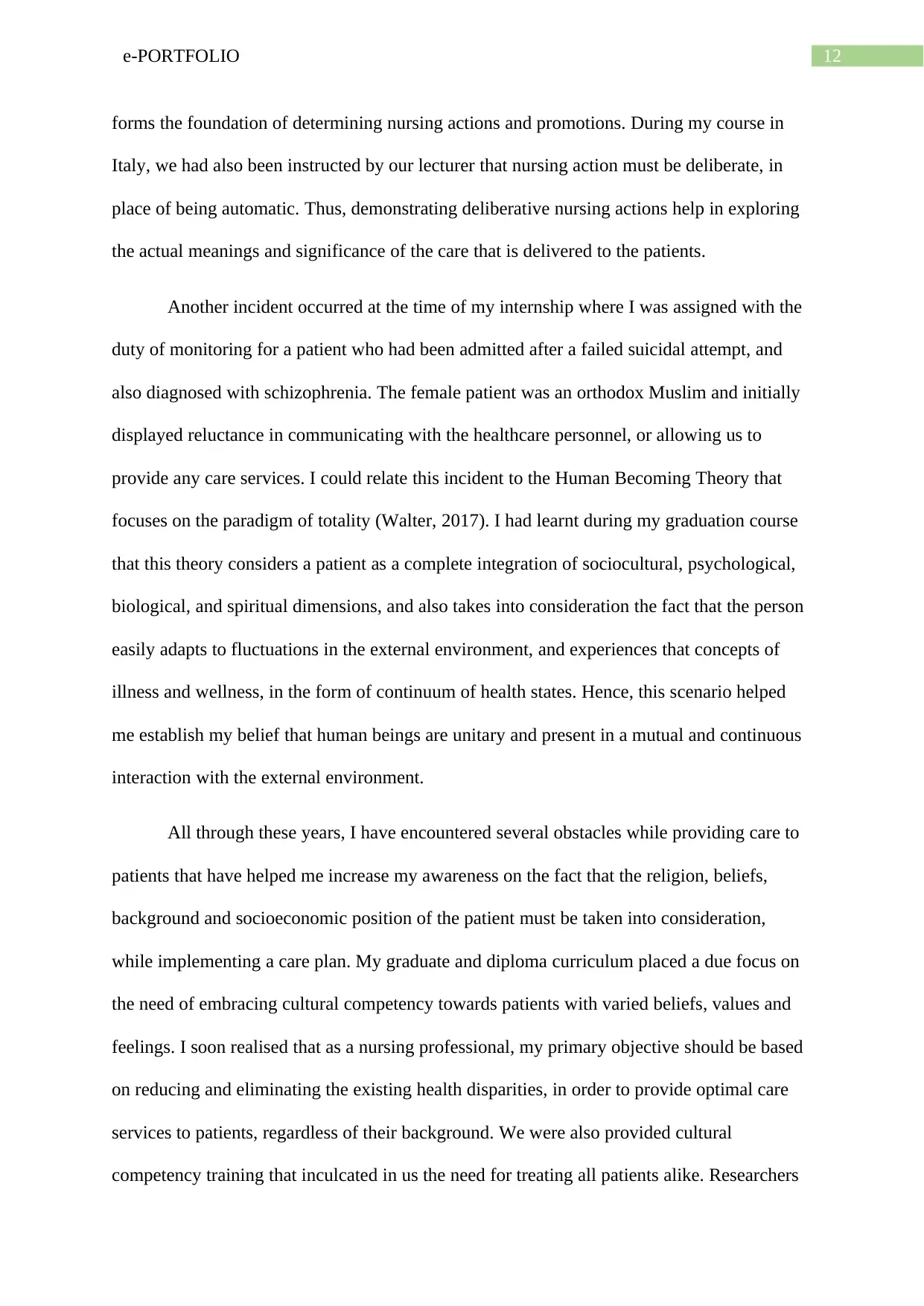
12e-PORTFOLIO
forms the foundation of determining nursing actions and promotions. During my course in
Italy, we had also been instructed by our lecturer that nursing action must be deliberate, in
place of being automatic. Thus, demonstrating deliberative nursing actions help in exploring
the actual meanings and significance of the care that is delivered to the patients.
Another incident occurred at the time of my internship where I was assigned with the
duty of monitoring for a patient who had been admitted after a failed suicidal attempt, and
also diagnosed with schizophrenia. The female patient was an orthodox Muslim and initially
displayed reluctance in communicating with the healthcare personnel, or allowing us to
provide any care services. I could relate this incident to the Human Becoming Theory that
focuses on the paradigm of totality (Walter, 2017). I had learnt during my graduation course
that this theory considers a patient as a complete integration of sociocultural, psychological,
biological, and spiritual dimensions, and also takes into consideration the fact that the person
easily adapts to fluctuations in the external environment, and experiences that concepts of
illness and wellness, in the form of continuum of health states. Hence, this scenario helped
me establish my belief that human beings are unitary and present in a mutual and continuous
interaction with the external environment.
All through these years, I have encountered several obstacles while providing care to
patients that have helped me increase my awareness on the fact that the religion, beliefs,
background and socioeconomic position of the patient must be taken into consideration,
while implementing a care plan. My graduate and diploma curriculum placed a due focus on
the need of embracing cultural competency towards patients with varied beliefs, values and
feelings. I soon realised that as a nursing professional, my primary objective should be based
on reducing and eliminating the existing health disparities, in order to provide optimal care
services to patients, regardless of their background. We were also provided cultural
competency training that inculcated in us the need for treating all patients alike. Researchers
forms the foundation of determining nursing actions and promotions. During my course in
Italy, we had also been instructed by our lecturer that nursing action must be deliberate, in
place of being automatic. Thus, demonstrating deliberative nursing actions help in exploring
the actual meanings and significance of the care that is delivered to the patients.
Another incident occurred at the time of my internship where I was assigned with the
duty of monitoring for a patient who had been admitted after a failed suicidal attempt, and
also diagnosed with schizophrenia. The female patient was an orthodox Muslim and initially
displayed reluctance in communicating with the healthcare personnel, or allowing us to
provide any care services. I could relate this incident to the Human Becoming Theory that
focuses on the paradigm of totality (Walter, 2017). I had learnt during my graduation course
that this theory considers a patient as a complete integration of sociocultural, psychological,
biological, and spiritual dimensions, and also takes into consideration the fact that the person
easily adapts to fluctuations in the external environment, and experiences that concepts of
illness and wellness, in the form of continuum of health states. Hence, this scenario helped
me establish my belief that human beings are unitary and present in a mutual and continuous
interaction with the external environment.
All through these years, I have encountered several obstacles while providing care to
patients that have helped me increase my awareness on the fact that the religion, beliefs,
background and socioeconomic position of the patient must be taken into consideration,
while implementing a care plan. My graduate and diploma curriculum placed a due focus on
the need of embracing cultural competency towards patients with varied beliefs, values and
feelings. I soon realised that as a nursing professional, my primary objective should be based
on reducing and eliminating the existing health disparities, in order to provide optimal care
services to patients, regardless of their background. We were also provided cultural
competency training that inculcated in us the need for treating all patients alike. Researchers
Paraphrase This Document
Need a fresh take? Get an instant paraphrase of this document with our AI Paraphraser
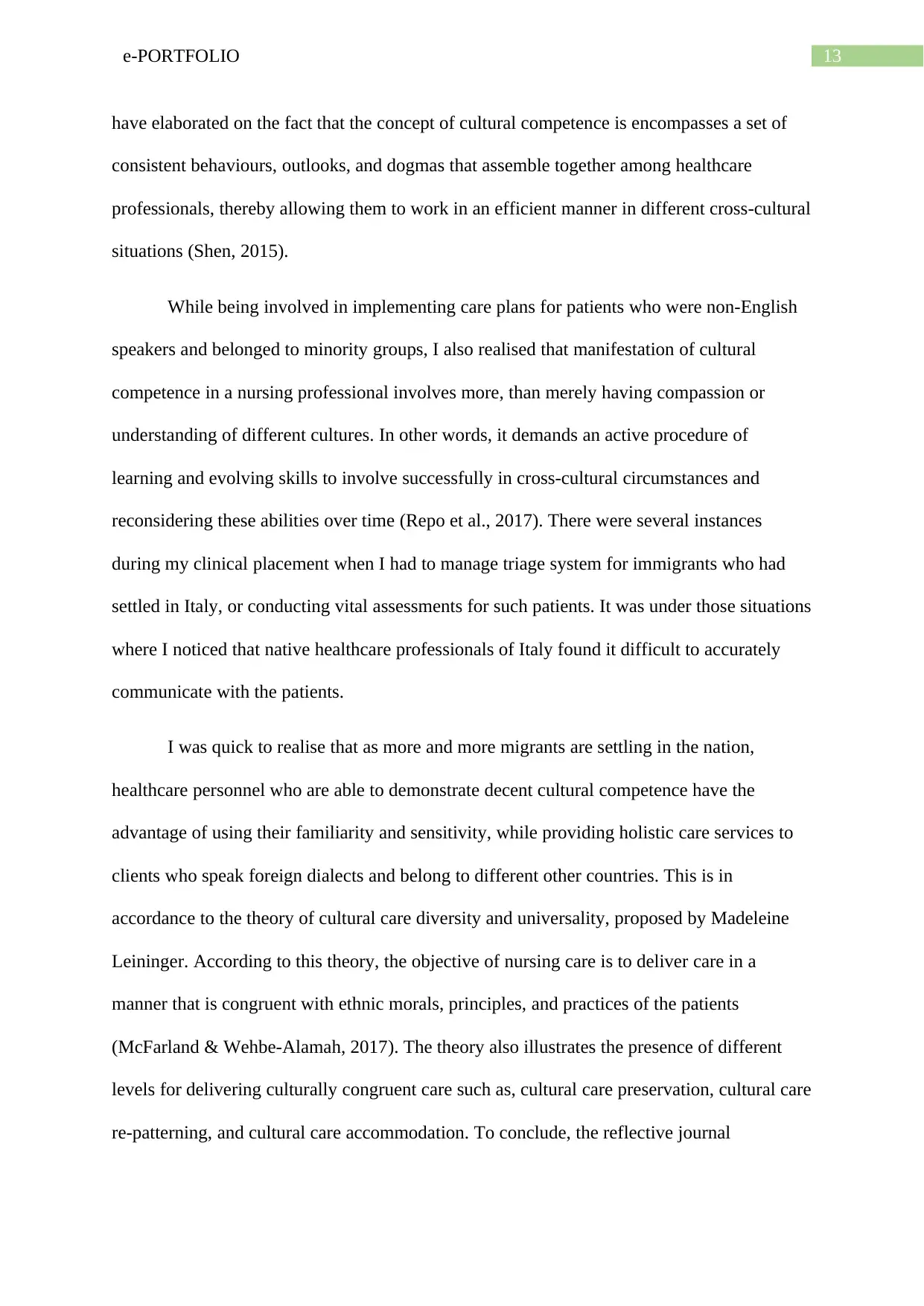
13e-PORTFOLIO
have elaborated on the fact that the concept of cultural competence is encompasses a set of
consistent behaviours, outlooks, and dogmas that assemble together among healthcare
professionals, thereby allowing them to work in an efficient manner in different cross-cultural
situations (Shen, 2015).
While being involved in implementing care plans for patients who were non-English
speakers and belonged to minority groups, I also realised that manifestation of cultural
competence in a nursing professional involves more, than merely having compassion or
understanding of different cultures. In other words, it demands an active procedure of
learning and evolving skills to involve successfully in cross-cultural circumstances and
reconsidering these abilities over time (Repo et al., 2017). There were several instances
during my clinical placement when I had to manage triage system for immigrants who had
settled in Italy, or conducting vital assessments for such patients. It was under those situations
where I noticed that native healthcare professionals of Italy found it difficult to accurately
communicate with the patients.
I was quick to realise that as more and more migrants are settling in the nation,
healthcare personnel who are able to demonstrate decent cultural competence have the
advantage of using their familiarity and sensitivity, while providing holistic care services to
clients who speak foreign dialects and belong to different other countries. This is in
accordance to the theory of cultural care diversity and universality, proposed by Madeleine
Leininger. According to this theory, the objective of nursing care is to deliver care in a
manner that is congruent with ethnic morals, principles, and practices of the patients
(McFarland & Wehbe-Alamah, 2017). The theory also illustrates the presence of different
levels for delivering culturally congruent care such as, cultural care preservation, cultural care
re-patterning, and cultural care accommodation. To conclude, the reflective journal
have elaborated on the fact that the concept of cultural competence is encompasses a set of
consistent behaviours, outlooks, and dogmas that assemble together among healthcare
professionals, thereby allowing them to work in an efficient manner in different cross-cultural
situations (Shen, 2015).
While being involved in implementing care plans for patients who were non-English
speakers and belonged to minority groups, I also realised that manifestation of cultural
competence in a nursing professional involves more, than merely having compassion or
understanding of different cultures. In other words, it demands an active procedure of
learning and evolving skills to involve successfully in cross-cultural circumstances and
reconsidering these abilities over time (Repo et al., 2017). There were several instances
during my clinical placement when I had to manage triage system for immigrants who had
settled in Italy, or conducting vital assessments for such patients. It was under those situations
where I noticed that native healthcare professionals of Italy found it difficult to accurately
communicate with the patients.
I was quick to realise that as more and more migrants are settling in the nation,
healthcare personnel who are able to demonstrate decent cultural competence have the
advantage of using their familiarity and sensitivity, while providing holistic care services to
clients who speak foreign dialects and belong to different other countries. This is in
accordance to the theory of cultural care diversity and universality, proposed by Madeleine
Leininger. According to this theory, the objective of nursing care is to deliver care in a
manner that is congruent with ethnic morals, principles, and practices of the patients
(McFarland & Wehbe-Alamah, 2017). The theory also illustrates the presence of different
levels for delivering culturally congruent care such as, cultural care preservation, cultural care
re-patterning, and cultural care accommodation. To conclude, the reflective journal
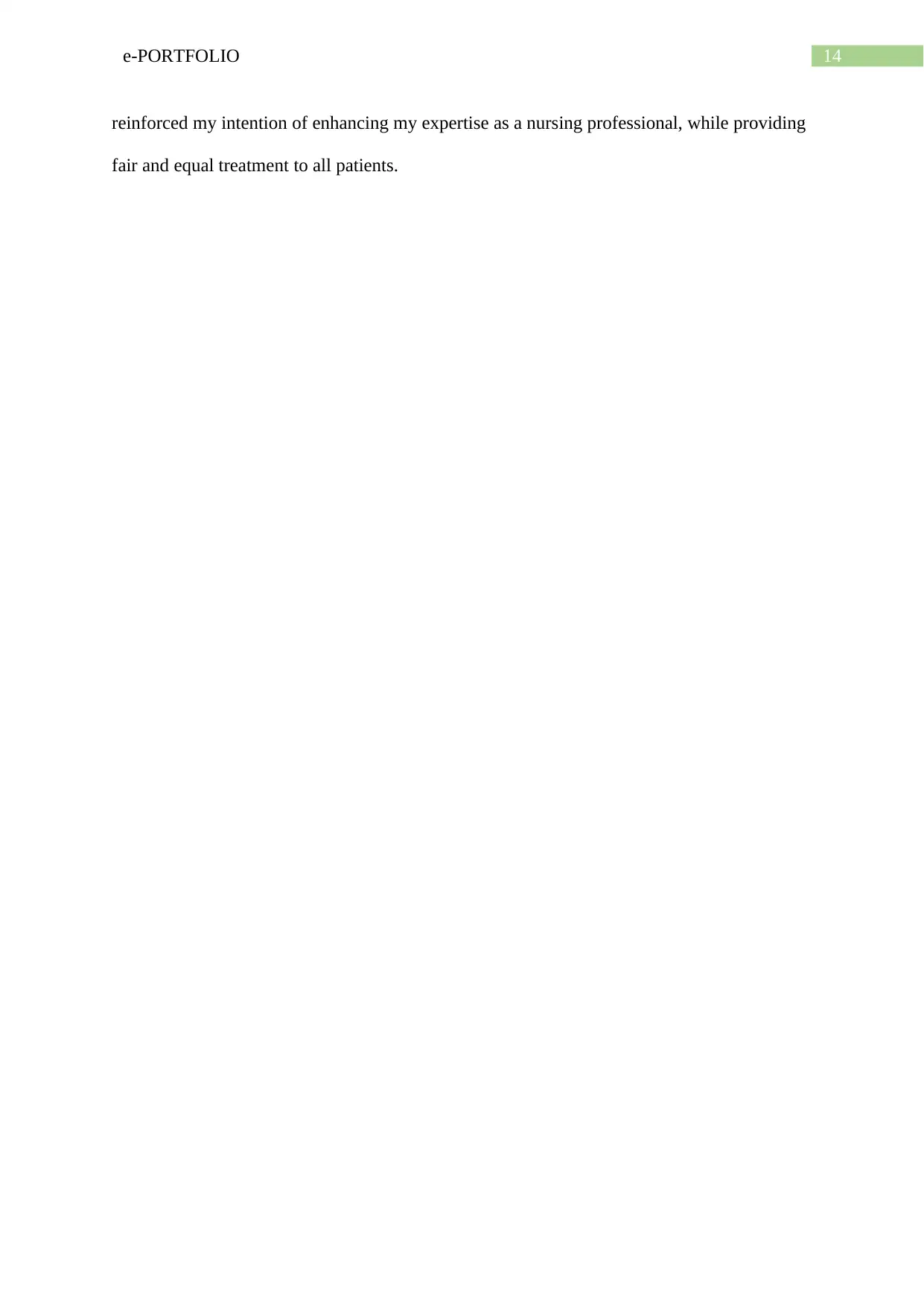
14e-PORTFOLIO
reinforced my intention of enhancing my expertise as a nursing professional, while providing
fair and equal treatment to all patients.
reinforced my intention of enhancing my expertise as a nursing professional, while providing
fair and equal treatment to all patients.
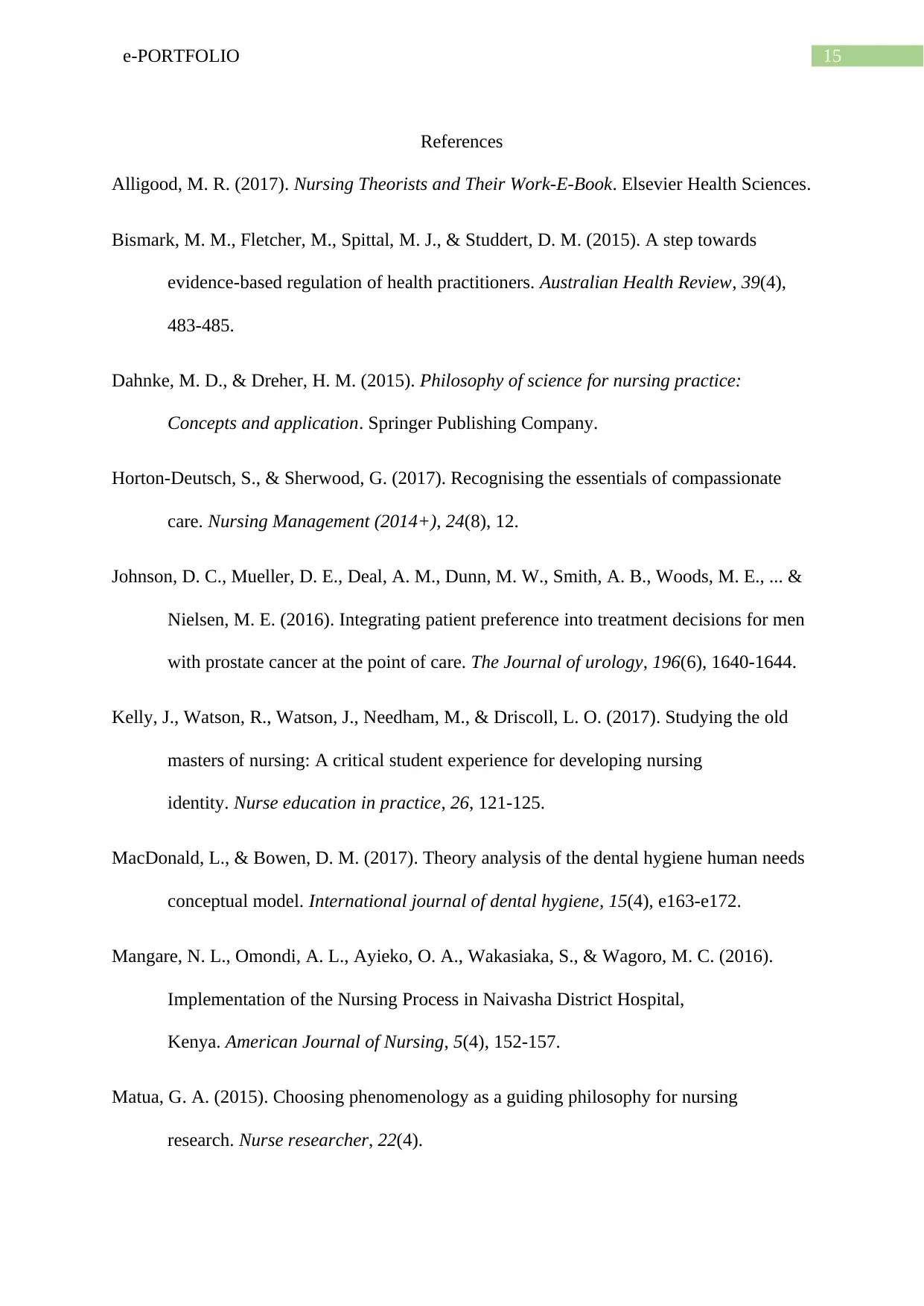
15e-PORTFOLIO
References
Alligood, M. R. (2017). Nursing Theorists and Their Work-E-Book. Elsevier Health Sciences.
Bismark, M. M., Fletcher, M., Spittal, M. J., & Studdert, D. M. (2015). A step towards
evidence-based regulation of health practitioners. Australian Health Review, 39(4),
483-485.
Dahnke, M. D., & Dreher, H. M. (2015). Philosophy of science for nursing practice:
Concepts and application. Springer Publishing Company.
Horton-Deutsch, S., & Sherwood, G. (2017). Recognising the essentials of compassionate
care. Nursing Management (2014+), 24(8), 12.
Johnson, D. C., Mueller, D. E., Deal, A. M., Dunn, M. W., Smith, A. B., Woods, M. E., ... &
Nielsen, M. E. (2016). Integrating patient preference into treatment decisions for men
with prostate cancer at the point of care. The Journal of urology, 196(6), 1640-1644.
Kelly, J., Watson, R., Watson, J., Needham, M., & Driscoll, L. O. (2017). Studying the old
masters of nursing: A critical student experience for developing nursing
identity. Nurse education in practice, 26, 121-125.
MacDonald, L., & Bowen, D. M. (2017). Theory analysis of the dental hygiene human needs
conceptual model. International journal of dental hygiene, 15(4), e163-e172.
Mangare, N. L., Omondi, A. L., Ayieko, O. A., Wakasiaka, S., & Wagoro, M. C. (2016).
Implementation of the Nursing Process in Naivasha District Hospital,
Kenya. American Journal of Nursing, 5(4), 152-157.
Matua, G. A. (2015). Choosing phenomenology as a guiding philosophy for nursing
research. Nurse researcher, 22(4).
References
Alligood, M. R. (2017). Nursing Theorists and Their Work-E-Book. Elsevier Health Sciences.
Bismark, M. M., Fletcher, M., Spittal, M. J., & Studdert, D. M. (2015). A step towards
evidence-based regulation of health practitioners. Australian Health Review, 39(4),
483-485.
Dahnke, M. D., & Dreher, H. M. (2015). Philosophy of science for nursing practice:
Concepts and application. Springer Publishing Company.
Horton-Deutsch, S., & Sherwood, G. (2017). Recognising the essentials of compassionate
care. Nursing Management (2014+), 24(8), 12.
Johnson, D. C., Mueller, D. E., Deal, A. M., Dunn, M. W., Smith, A. B., Woods, M. E., ... &
Nielsen, M. E. (2016). Integrating patient preference into treatment decisions for men
with prostate cancer at the point of care. The Journal of urology, 196(6), 1640-1644.
Kelly, J., Watson, R., Watson, J., Needham, M., & Driscoll, L. O. (2017). Studying the old
masters of nursing: A critical student experience for developing nursing
identity. Nurse education in practice, 26, 121-125.
MacDonald, L., & Bowen, D. M. (2017). Theory analysis of the dental hygiene human needs
conceptual model. International journal of dental hygiene, 15(4), e163-e172.
Mangare, N. L., Omondi, A. L., Ayieko, O. A., Wakasiaka, S., & Wagoro, M. C. (2016).
Implementation of the Nursing Process in Naivasha District Hospital,
Kenya. American Journal of Nursing, 5(4), 152-157.
Matua, G. A. (2015). Choosing phenomenology as a guiding philosophy for nursing
research. Nurse researcher, 22(4).
Secure Best Marks with AI Grader
Need help grading? Try our AI Grader for instant feedback on your assignments.
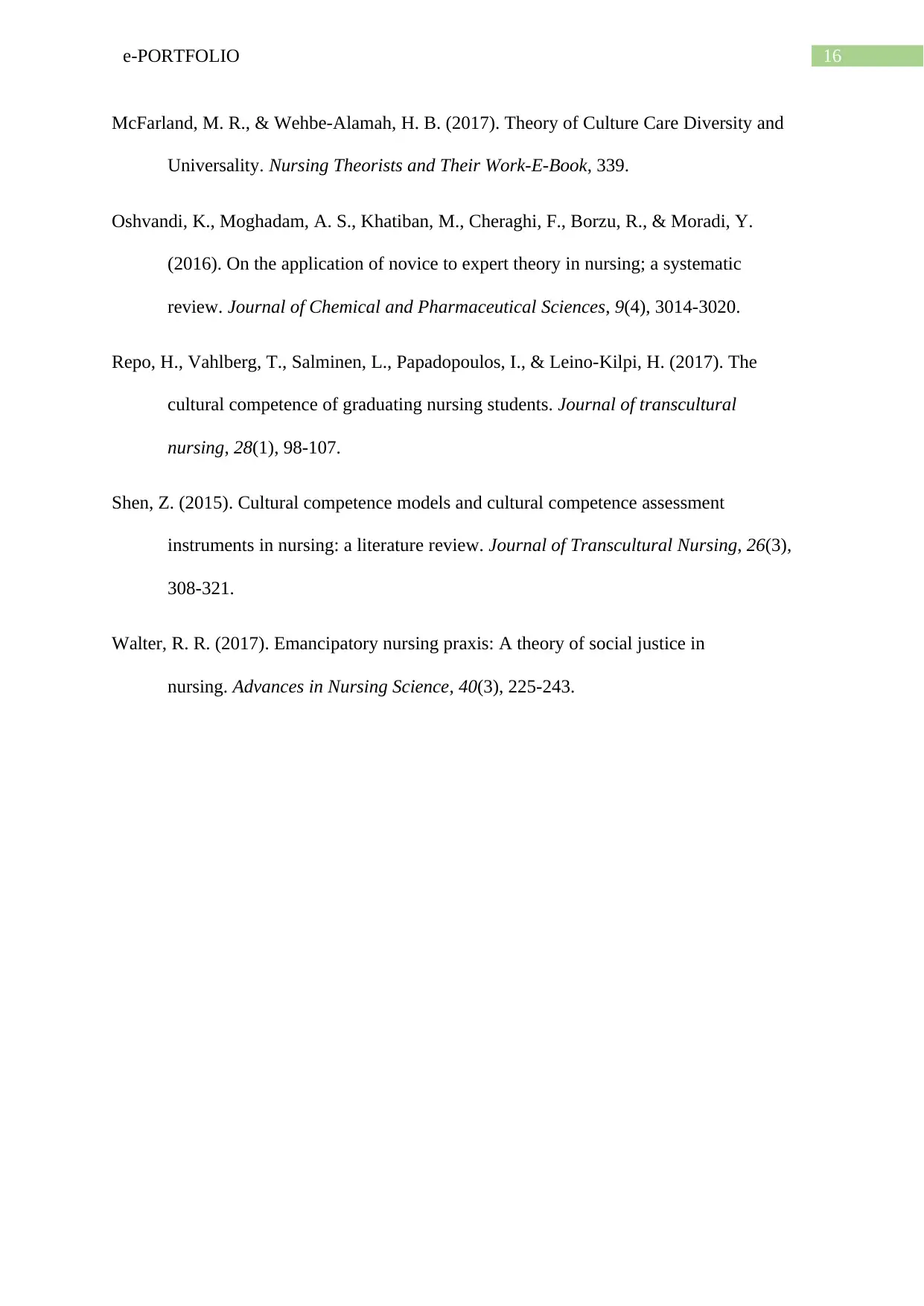
16e-PORTFOLIO
McFarland, M. R., & Wehbe-Alamah, H. B. (2017). Theory of Culture Care Diversity and
Universality. Nursing Theorists and Their Work-E-Book, 339.
Oshvandi, K., Moghadam, A. S., Khatiban, M., Cheraghi, F., Borzu, R., & Moradi, Y.
(2016). On the application of novice to expert theory in nursing; a systematic
review. Journal of Chemical and Pharmaceutical Sciences, 9(4), 3014-3020.
Repo, H., Vahlberg, T., Salminen, L., Papadopoulos, I., & Leino-Kilpi, H. (2017). The
cultural competence of graduating nursing students. Journal of transcultural
nursing, 28(1), 98-107.
Shen, Z. (2015). Cultural competence models and cultural competence assessment
instruments in nursing: a literature review. Journal of Transcultural Nursing, 26(3),
308-321.
Walter, R. R. (2017). Emancipatory nursing praxis: A theory of social justice in
nursing. Advances in Nursing Science, 40(3), 225-243.
McFarland, M. R., & Wehbe-Alamah, H. B. (2017). Theory of Culture Care Diversity and
Universality. Nursing Theorists and Their Work-E-Book, 339.
Oshvandi, K., Moghadam, A. S., Khatiban, M., Cheraghi, F., Borzu, R., & Moradi, Y.
(2016). On the application of novice to expert theory in nursing; a systematic
review. Journal of Chemical and Pharmaceutical Sciences, 9(4), 3014-3020.
Repo, H., Vahlberg, T., Salminen, L., Papadopoulos, I., & Leino-Kilpi, H. (2017). The
cultural competence of graduating nursing students. Journal of transcultural
nursing, 28(1), 98-107.
Shen, Z. (2015). Cultural competence models and cultural competence assessment
instruments in nursing: a literature review. Journal of Transcultural Nursing, 26(3),
308-321.
Walter, R. R. (2017). Emancipatory nursing praxis: A theory of social justice in
nursing. Advances in Nursing Science, 40(3), 225-243.
1 out of 17
Related Documents
Your All-in-One AI-Powered Toolkit for Academic Success.
+13062052269
info@desklib.com
Available 24*7 on WhatsApp / Email
![[object Object]](/_next/static/media/star-bottom.7253800d.svg)
Unlock your academic potential
© 2024 | Zucol Services PVT LTD | All rights reserved.





